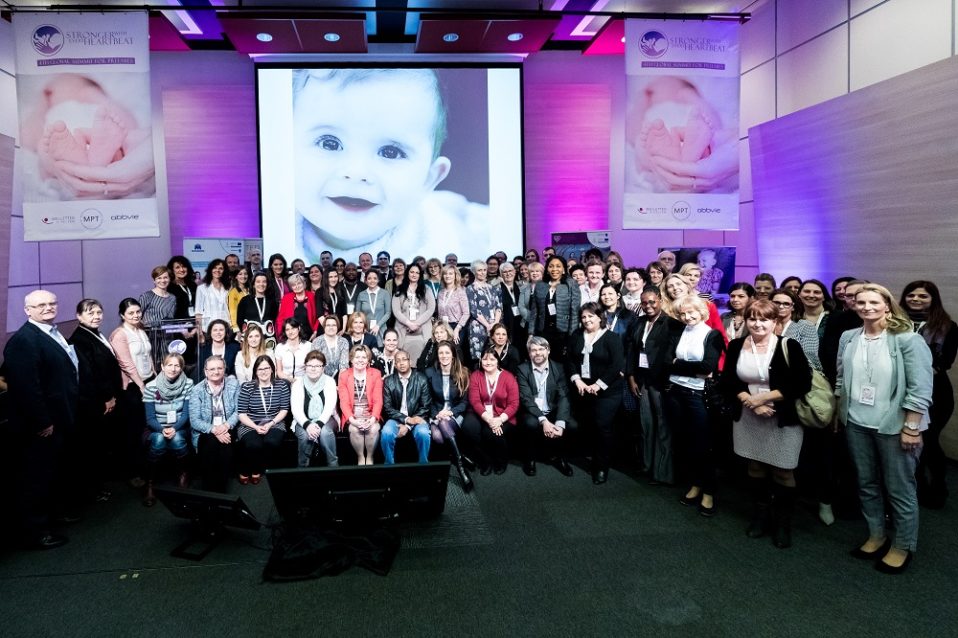From 16-17th of February 2018 the association Melletted a helyem Egyesület (Right(s) beside you) and the Hungarian Perinatal Society hosted the „IV. Global Summit for Preemies” in Budapest, Hungary, following the succesful events in Poland, Columbia and Bulgaria. The summit brought together 120 participants, from 23 countries ranging from Argentina to Kenya, Belarus and the United States. Healthcare professionals, parent organisations and policy makers gathered for knowledge & experience exchange.
A guest article by Livia Nagy, vice-president of Melletted a helyem Egyesület
It was an honour to welcome participants from a multidisciplinary field from all over the world in Budapest and continue the annual discussion to exchange insights through the presentation of effective policies, best practice experiences, succesful strategies and evidence-based findings to deal with the challenges preterm babies and their families are facing. Couple of years ago Hungarian NICUs were not designed or functioned as a family-friendly environment, healthcare professionals found it difficult to deal with our tears, our fears and our versatile backgrounds. Our association was born during the very first global summit in Warsaw, Poland, four years ago, while we had a long discussion with Professor Tibor Ertl to realise better outcomes for preterm babies and their families. Few weeks after the first summit Dr Csaba Nádor and Dr Miklós Szabó joined the discussions and together we formed the Association.
Dr. Szabó Miklós, President of Hungarian Perinatal Society: „the recent progress in care procedures of preterm babies, mainly the result of recognition the importance of the use of non-invasive treatment modalities, reducing the level of stressful procedures and environment and incorporating parents as partners into the care of their infants. The philosophy of neonatology has been changed deeply and professionals need to learn new skills and develop new policies which often contradict traditional medical paradigms.”
There are good practices and comprehensive follow-up programmes, which globaly result in improved standards of care for preterm babies and support their families to cope with the challenges of preterm birth. „Including every preterm in the follow-up programme requires teamwork” said Dr Liis Toom from Estonia as they have one of the strongest and long-standing follow-up programme in Europe. A round-table discussion highlighted the challenges of the previous host countries of the summit, and mentor programmes from Portugal and Hungary introduced their projects which were realised through EU funding.
The agenda also focused on the importance of parental involvment in neonatal research, parental participation in the newborn care, developing family-centred care services after discharge, mental support of the parents, and how to create a safe neurodevelopmental environment for newborn infants as for example noise, light, pain increase the risk for a wide range of developmental problems.
Dr Eszter Bodrogi During gave an insight how the NICU where „the baby is the boss” became the first family centred neonatal intensive care unit in Hungary. Looking back at the last eight years she showed the opportunities and challenges of making a change – from a traditional and protocol-centred system, to the first steps of family integrated care.
Professor György Balla presented the results of his latest research shown that nearly half of the children under one year who were hospitalised with bronchitis got an RSV infection during the 2016-2017 season.
The event ended with NICU visits and as a result of the succesful summit on 5 April, Lívia Nagy (Vice-President of Melletted a helyem Egyesület) and Mandy Daly (Director of Advocacy & Policy Making, Irish Neonatal Health Alliance) had the pleasure to meet with Dr Attila Beneda (Deputy of Secretary of States for Families) and Dr Ildikó Lelkes (Head of department of family policy) from the Hungarian Ministry of Human Capacities and Dr Miklós Szabó (President of the Hungarian Perinatal Society) to discuss the future of family-centred care in Hungary. We look forward to future multi stakeholder collaboration and a better future for Hungarian preterm infants. We have high hopes to implement the European Standards of Care for Newborn Health project and with a detailed benchmark study, every preterm baby in Hungary will get equal treatment and care in every Hungarian NICU.
Special thanks to
Livia Nagy, vice-president of Right(s) besides you Association


